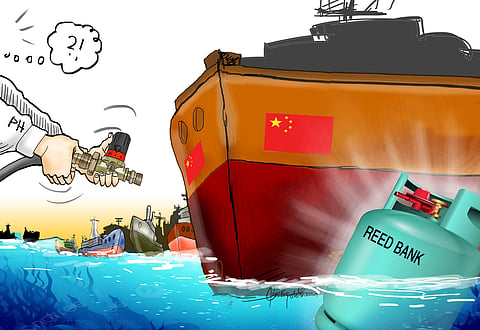
- NEWS
- the EDIT
- COMMENTARY
- BUSINESS
- LIFE
- SHOW
- ACTION
- GLOBAL GOALS
- SNAPS
- DYARYO TIRADA
- MORE

Keen observers of the Philippine-China tussling over issues pertinent to the South China Sea (SCS) say President Ferdinand R. Marcos is correct in internationalizing the maritime dispute since the body of water is vital to international trade.
China has always insisted that the resolution of disputes regarding the SCS should exclusively be limited to claimants, but Joshua Espeña, a research fellow in the policy research think tank, International Development, and Security Cooperation points out that “President Marcos is on the right track in resisting that, doing what he has been doing, using unilateral and multilateral approaches, that is, involving groups of nations allied to its cause in trying to contain excessive moves by the Chinese in Philippine territorial waters.”
“This is vital,” stressed Espeña, “given the Philippines’ limitations in capability to protect its fishermen and denying Chinese arrest.”
Philippine big business representatives, likewise, back the President’s approach to the SCS issue, including MERALCO chairman and CEO Manny V. Pangilinan, who says the President has been “making the right decision” where it concerns matters regarding the SCS.
“We fully support him,” underscores Pangilinan who likewise chairs PXP Energy Corp, which holds a 50 percent interest in Service Contract 75 issued by the Department of Energy in northwest Palawan and nearly 80 percent in London-listed Forum Energy which has a 70 percent participating interest in Service Contract 72 which covers the Reed Bank.
Also known as Recto Bank, the Reed Bank is the major gas exploration project in the West Philippine Sea now placed amid heightened tension between the Philippines and China.
Pangilinan’s PXP Energy Corp. had already deployed vessels in the area to conduct seismic surveys so as to determine where to start drilling, but the then Duterte government in April 2022 ordered PXP to hold all exploration activities for both Service Contracts 75 and 72. Until now, the Cabinet Security, Justice and Peace Coordinating Cluster under the current government has yet to issue clearance to proceed and there is no telling when activities can resume amid the tension between the Philippines and China in the SCS.
But the country’s critically urgent need to look for alternative sources of energy cannot be overemphasized particularly with the impending exhaustion of the Malampaya offshore gas fields in two, three years, or so.
Tapping Reed Bank is of utmost necessity, what with its estimated 5.4 billion barrels of oil and 555.1 trillion cubic feet of gas –at least 64 times more oil and 21 times more gas than Malampaya – estimates known to the Department of Energy.
Anticipating the resumption by PXP or any other Philippine-led service contractors in the area, China has been deploying a mass of vessels in the area, harassing seacraft manned by Philippine servicemen on supply missions to the beached BRP Sierra Madre at Ayungin Shoal which is within the Reed Bank.
Former Bangko Sentral ng Pilipinas deputy governor and now GlobalSource Partners Philippine analyst Diwa Guinigundo likewise laments the Philippine-China dispute which involves “the country’s limited access to our own resources.”
Guinigundo expressed anxiety over a looming energy crisis in the country with China’s persistence in barring the Philippines from exploring and drilling in Reed Bank. “If we are unable to access the Reed Bank for its estimated substantial reserves of oil and natural gas, we might be facing a possible energy crisis,” he said.
Philippine economic managers would be hard put to propel the country, which is a net importer of food and gas, to meet growth targets. “Unless we find alternative sources of renewable energy and rationalize power generation, transmission and distribution, it would be difficult to achieve our target growth rates,” the GlobalSource Partners Philippine analyst said.
Nikkei reports that foreign corporations are leaving China due to tougher crackdowns on spying and U.S. sanctions, even as the prolonged slowdown of the Chinese economy.
According to Ateneo Professor of Economics Leonardo Lanzona, “the exodus of firms from China is unlikely to benefit the country since the government has put the Philippines at the center of this tension.”
Instead, he said, the country’s neighbors like Thailand and Vietnam “are taking advantage of the current situation as foreign firms exiting China are moving into these countries.”
What Lanzona suggests is that the Philippines could make an effort to maintain stable diplomatic ties with Beijing even as it continues to defend its sovereignty and focus on making local industries more attractive to investors. Is that even possible, at this juncture?
